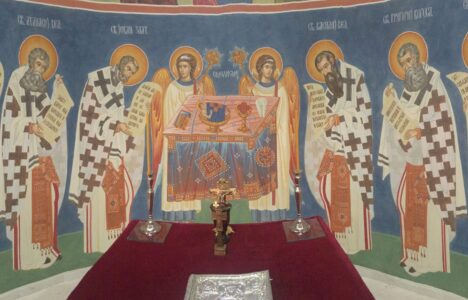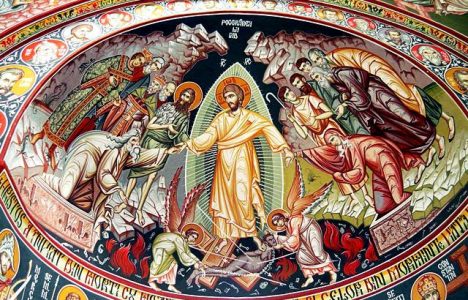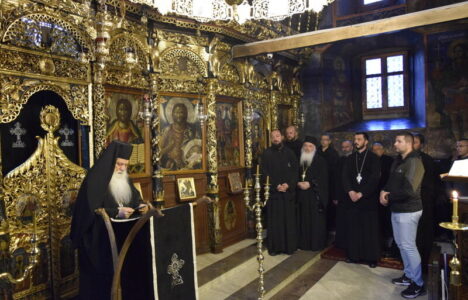ЛИТУРГИЈА НА ПРЕДХОДНО ОСВЕТЕНИ ДАРОВИ – ОТЕЦ ГАВРИЛ ГАЛЕВ
Литургијата од една страна e реална животна средина, а од друга страна, извор од кој ние се храниме со непропадлива храна. И заради тоа нас ни е потребно да живееме во таа атмосфера и да се храниме со таа храна. Затоа и Господ пред да биде распнат, пред да умре на Крстот, да воскресне и да се вознесе, ни ја покажа и ни ја даде таа вистинската храна – Телото …
ВЕЛИКИОТ ПОСТ – ПАТ КОН ВОСКРЕСЕНИЕТО
Кога човек се спрема да појде на пат, тој треба да ја знае целта на своето патување. Истото се однесува и на Великиот пост. Постот е пред сѐ духовно патување, а негова крајна цел е Пасха (Воскресението, Велигден), „благденот над благдените“. Постот е припрема за „исполнување на Пасхата, како вистинито Откровение“. Затоа, најнапред, мораме да ја разбереме врската помеѓу Великиот пост и Пасхата, оти таа врска ни открива нешто суштествено, …
БЕСЕДА НА МИТРОПОЛИТОТ Г. ТИМОТЕЈ НА ВЕЧЕРНАТА ПРОШТАЛНА БОГОСЛУЖБА
„Господи и Владико на мојот живот, не давај ми дух на мрзливост, изнемоштеност, властољубивост и празнословие“ (молитва на св. Ефрем Сирин) На 17.03.2024 година, во Сирната недела – Прочка, во вечерните часови, во храмот „Успение на Пресвета Богородица“ – Каменско во Охрид, беше отслужена Вечерна богослужба, на којашто чиноначалствуваше Неговото Високопреосвештенство Митрополитот Плаошко-струшки и Дебарско-кичевски и Администратор Австралиско-сиднејски г. Тимотеј, во сослужение на архимандритот Нектариј, протоерејот-ставрофор Никола Христоски, свештеникот …
INTERPRETATION OF THE LENTEN PRAYER OF ST. EPHRAIM THE SYRIAN - FATHER GAVRIL GALEV
This prayer is included in the liturgical cycle in the Lenten-Triodion throughout the entire period of the Great Lent. Beginning on Tuesday and Thursday evening (Wednesday and Friday services), in the Cheesefare Week before the Great Lent begins, until the Passion Week (Holy Week), each worship ends with the prayer of St. Ephraim the Syrian. Saint Ephrem the Syrian was a monk, a 4th century hermit living in Syria. He was a very great ascetic who attained great repentance. He is a writer of many repentant songs that derived from his repentant invaluable inner spirit. He was not educated, but the Holy Spirit taught him. This prayer is one of many of his repentant prayers. It is simple and very short, and at the same time very comprehensive and precise. It is the core, the center of spiritual life in the Church. The prayer reads: Lord and Master of my life, do not give me the spirit of sloth, despair, love of power, and idle talk. (Prostration) But to me, Your servant give me rather, the spirit of chastity, humility, patience and love. (Prostration) Yea, O Lord and King, grant me to see my own transgressions and not judge my brother, for blessed art Thou unto the ages of ages. Amen. (Prostration) Most likely, this prayer is written in Arabic or Syriac, and there is little difference between one translation to another. Our Church-Slavic translation is very precise. st-ephraim sirianLord and Muster of my life – is the first phrase of the prayer. With this call St. Ephraim confesses that the Lord is our God and Master, and that we are His creatures and servants. Because we have sinned, we are not worthy of calling ourselves sons, as before, therefore we call Him Master. He is Lord and Master Who loves us and prepares our life. This prayer is for our enlightenment and true knowledge of ourselves and proper direction of our lives. Nowadays, many different ideologies and philosophies are presented to us as being correct, but without the Lord as our Bishop, everything is missed. Saint Ephraim the Syrian knows this and confesses it through this prayer. In the first phrase we also pray: do not give me the spirit of sloth (do not give me the spirit of emptiness). Emptiness is essentially the emptying of the fullness of life, the emptying of the divine life energies from us, resulting in aimlessness (hopelessness) in life. In this phrase (supplication), we ask the Lord to take out that spirit of aimlessness from our lives. Slothfulness (Laziness) is closely related to the emptiness, therefore, the Holy Fathers of the Church say “laziness is the beginning of all sins.” When we make a mistake, as our justification we would say that “we did not know,” but that does not justify us. We did not know because we did not want to find out, we were lazy and we did not care to find out. Our state of sobriety (awareness) should be like the state of the cherubims and the six-winged seraphims. We should contemplate all things, be quick in the fulfillment of God’s commandments, and exalt ourselves towards the spiritual. But because of our sin, we have become lazy, blunt, disinterested, and because of that we have allowed dark forces, passions and fallen devils to rule us. We are unable to lift ourselves up. We are feeble for the spiritual life, and in fact this is emptiness. Although we live, we have no goal or idea in our lives. We exist as beings but we are not moving forward, but we are standing in one and the same spot, we are not doing anything and we are not progressing. This situation can be compared with that part of the Gospel, where the Lord says that when the demons are driven out of our souls and hearts, but because we are lazy and do not try to attract the grace of the Holy Spirit within us, then again devil comes back and he sees that the home is swept, but empty and deserted, and then he will bring more demons and reign in us. Then there is an even more difficult situation, and this is the despair (desolation), which we pray in the prayer of St. Ephraim for the Lord to deliver us from. The state of despair is more than disappointment, depression, laziness or hopelessness. It is a state of lethargy for life and indifference to the salvation of the soul. Despair is the absence of the Lord as a goal and substance (essence) in our life. Because of the laziness we allowed the demon to occupy the space and authority upon us, (with each sin, the demon enters in us, whether it is a great or a small sin) and he acts, presses upon us. In every situation, we need to act according to Jesus Christ, that is, in accordance with the Gospel, and if we do not act according to those criteria, we miss the way and we miss the goal. And consequently, little by little, while sinning, as when we collect sand in a sack and we carry it on the back, so our sins are burdening us, and we do not even see them. They burden us, we go down and we wonder why. The present time offers us the opportunity for many such “petty” sins. If we abandon Christ, then we do not act according to His commandments, but we act according to today’s “fallen from God” laws, we are filling ourselves with sins, and consequently we come to emptiness and hopelessness, in other words we come to despair. In the end, we should call upon the Lord as our Bishop in our lives and reject all hopelessness and despair from us. Although the path is narrow and thorny (bumpy), we still have to walk it because the prize awaits us at the end of the path. The third supplication of St. Ephraim is for the Lord to protect us from the lust (love) of authority. We may ask ourselves how (why) St. Ephraim connects laziness and love of power? Namely, both laziness and despair come from pride, and all this contributes men to become power-loving. Because man is proud and power-loving, and if he can not realize these passions, he falls into despair and laziness (emptiness). While going in the opposite direction, he has missed his life, and now he wants somehow to fill that empty space, and he does not want to (he is lazy) put in effort and labor, he becomes proud and he imagines his own kingdom and he “reigns” in it. Lately, this is especially enabled by social networks like Facebook and so on. The “love of power” is one of those temptations that the devil brought to Adam in Paradise. Such a life is a deceptive life, in illusion, in clouds, in delusion and in loneliness. St. Ephraim is aware of this temptation and therefore asks the Lord to deliver him from it. The power-loving man is prepared for everything. His heart becomes cold, cruel, insensitive, and, he loses humanity, he loses the image of God in himself. He, in himself has his own power-hungry goal only and he wants to achieve it no mater what. The last phrase of the first part of this prayer is about idle talk. Again, we ask ourselves why St. Ephraim out of many important things singles out idle talk as such a big problem. We will say to ourselves, it is only idle talk, and it is not such a big deal. But it is not mentioned here accidentally. Idle-talk is directly related to all of these bad habits that St. Ephraim previously pointed out. If we examine the term “idle-talk”, we will end up with an idle word, an empty word, a word without sense or reason. It means unreasonableness, foolishness. Spirit of emptiness. That is the same condition of the soul that we have been talking about so far. Those who speak a lot can notice that they are so tired at night, although they have not done any work. They are lazy and lethargic. Through thoughtless idle-talk, we involuntarily hurt people, and when we hurt someone, we actually hurt Christ. That is why it is one of the greatest sins. Those who engage in idle-talk are often gluttonous, proud, self-centered, liars, self-absorbed … which is the complete opposite to the teachings of the Gospel. When a person is restrained, he thinks and his word has weight, meaning, he is honest and enlightened, which is already Theology. Our word should be measured and blessed by God, then our word will be gentle, and our lips will be gracious and this word will reach the people. And the grace of God will be with us. A very good example of this is Abba Pambo, who at the end of his life said that after becoming a monk, he did not regret any word he had spoken, which means that each of his words was measured with sense, pronounced with meaning, one word, but heavy as a mountain. That’s why people unconditionally listened to him. Or, like St. John Chrysostom, whose preaching we still respect today, and they enlighten people. This completes the first part of the prayer of St. Ephraim, and in fact, that is what we do not want; in other words, that is what we want to get liberated from. And in the end we bow, which means that we fully participate in the prayer, with the soul and the body. The second part of the prayer of St. Ephraim of Syria reads: “But to me, Your servant, give me the spirit of chastity, patience and love.” In the supplication: “But to me, Your servant” – we confess the Lord as the Bishop, and ourselves as a servants. That is a feeling of the greatness of God and our nothingness (badness). St. Ephraim says: “Grant me O Lord”, because all good is from the Lord and is the gift of God, and nothing should be considered as our merit. “Give me the spirit of chastity” – This is not relating only to the purity of our body, but to the whole being and persona. Complete, perfect wisdom. It is a condition. With this supplication, we seek the purity of the body and our whole spirit and life. It is the return to the original human condition (before Adam and Eve sinned) and after that, it is progression to the level of deification, progression to the level of likeness to the Lord. This is achieved only with struggle (effort). We have to struggle physically, to endure in the unceasing prayer, to have our own spiritual father to whom we will confess our sins and partake in the Holy Communion. By purifying our heart from passions, we enlighten our mind and deificate our whole being. Then St. Ephraim asks in the prayer, for humility. Humility is the first step of the ladder. If we want to climb in the spiritual life, inevitably, we will have to start from humility and therefore St. Ephraim asks specifically for humility from the Lord. In Church Slavonic language it is called humble-astuteness, humble and wise, enlightened mind. Our biggest problem is the pride of the mind and therefore we should humbly subdue it under some other mind. Pride is also a spiritual blindness. Since we are spiritually blind, we need a spiritual leader who would guide us and keep us safe on the road, so that we do not fall (go astray). This spiritual leader is the priest of our parish, or a priest-monk from a monastery or originally our spiritual leader is our Bishop. To a spiritual father we need to subdue our proud mind in order to be healed. With confession and complete obedience, we put our mind in the process of healing and enlightenment. After chastity and humility, we seek from God patience, or rather enduring patience (enduring tolerance, long-suffering). Patience is like watering seeds. If the seeds that we plant are not constantly watered, then they will not germinate. Or if the seed has already germinated it will die, if it has no water. That is why long-suffering is needed in the struggle of purification of the heart. Long-suffering should accompany us to the end of our life. In the end, St. Ephraim asks God for love, pure, perfect love, in which we give ourselves completely to God and to others. Love should be pure, unconditional, free and complete. Love is our natural, inborn quality, because God gave it to us in the beginning, creating us in His image and likeness. When we love, we become likeness of God, when we do not have love, we are similar to the devil. If we allow some weakness of a brother or a sister to stand between us and to stir our mind and heart, to hesitate to love him, then we have no real love. Love covers many sins. True love does not allow anything to stand between me and God and between me and my neighbour. Love covers and eliminates it. Love is the most important of all, and as the poet of love, St. Ap. Paul testifies: “If I have no love, I am nothing …” If I have no love, nothing benefits me … And now these three things remain: faith, hope, and love; the greatest among them is love. (1 Cor. 13, 1-13) These virtues; chastity, humility, patience and love are opposite to the aforementioned passions and they defeat them. Then once again we bow as a confirmation to all of this and for the third time we stand up in the prayer and supplicate: “Yes, O Lord and Tsar, grant me to see my own transgressions and not judge my brother, for blessed art Thou unto the ages of ages. Amen!” Condemnation (judgment ) is a huge obstacle in the spiritual life. Condemnation is a very dangerous passion. When a person purifies his heart from the passions, he liberates himself from the bondage of passions and sins, and the grace is so strong that it keeps him separated and it is almost impossible for the ascetic to repeat the sins. However, condemnation is a very realistic situation and the Holy Fathers say that condemnation can push the ascetics again, because the condemnation in fact, has accumulated many passions as one. As condemnation is so dangerous for the proven ascetics, then how much more dangerous is it for us, the ordinary mortals. The reason for condemning others, above all, is pride. It darkens the light of the mind and we do not perceive our sins, but as our justification we see and condemn the same sins in the others. We ask for mercy for ourselves, and, from others we ask for perfection. This is the most successful of the devil’s tactics against unity and love among people. Not recognising our sins, hiding them or justifying ourselves, and at the expense of exaggerating the mistakes of the others and making them so unforgivable. In this way there is no progress in the spiritual life and therefore St. Ephraim is praying for the Lord to grant him spiritual eyes to distinguish that. At the end, the prayer finishes with the blessing of God, Who simply is blessed unto all ages. And Amen puts a seal on the aforementioned, and verifies that it is so. Then we make another bow, and we say 12 times “Lord have mercy” and once again we say the whole prayer with a bow at the end. If we think a little about the scale of the three stages of spiritual life – purification, enlightenment, and deification – in the first proclamation St. Ephraim describes the state of purification of the heart, in the second proclamation, features of enlightenment and deification are represented together. This prayer should be said at all times, and especially during the Great Lent when the ascetic-hesychastic spirit is emphasized. Through the prayers of the holy St. Ephraim the Syrian, Lord Jesus Christ, have mercy on us. Amen! Fr. Gavril (Galev) Abbot of the monastery “St. Clement of Ohrid”, Kinglake, Melbourne, Australia 18 / 03 / 2021








